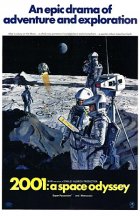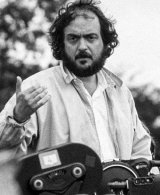
2001: A Space Odyssey Page #17
- G
- Year:
- 1968
- 149 min
- $135,620
- 1,829 Views
We've examined dozens of theories,
but the one that has the most
currency at the moment is that
the object serves as an alarm.
What the purpose of the alarm is,
why they wish to have the alarm,
whether the alarm represents
questions no one can answer.
The intentions of an alien world,
at least four million years older
than we are, cannot be reliably
predicted.
In view of this, the intelligence
and scientific communities felt
that any public announcment
might lead to significant cultural
shock and disorientation.
Discussion took place at the
highest levels between govern-
(con't)
12/14/65 c126
------------------------------------------------------------------------
C150
CONTINUED:
FLOYD (con't)
ments, and it was decided that the
only wise and precautionary
course to follow was to assume
that the intentions of this alien
world are potentially dangerous
to us, until we have evidence to
the contrary.
This is, of course, why security
has been maintained and why
this information has been kept
on a need-to-know basis.
And now I should like to show you
a TV monitor tape of the actual
signalling event.
12/14/65 c127
------------------------------------------------------------------------
C151
WE SEE A REPLAY:
OF THE TMA-1 RADIO
EMISSION, AS SEEN
FROM A TV MONITOR
ON THE SPOT. WE
HEAR THE FIVE LOUD
ELECTRONIC SHRIEKS.
12/1/65 c128
------------------------------------------------------------------------
D1
IN ORBIT WITHIN THENARRATOR
RINGS OF SATURN, WEFor two million years, it had
SEE A BLACK, MILE circled Saturn, awaiting a
LONG, GEOMETRICALLYmoment of destiny that might
PERFECT RECTANGLE, never come.
THE SAME PROPORTIONS
AS THE BLACK ARTIFACT In its making, the moon had been
EXCAVATED ON THE MOON. shattered and around the central
PRECISELY CUT INTO ITS world, the debris of its creation
CENTRE IS A SMALLER, orbited yet - the glory and the
RECTANGULAR SLOT enigma of the solar system.
ABOUT FIVE HUNDRED
FOOT LONG ON THE SIDE. Now, the long wait was ending.
AT THIS DISTANCE, THE On yet another world intelligence
RINGS OF SATURN AREhad been born and was escaping
SEEN TO BE MADE OF from its planetary cradle. An
ENORMOUS CHUNKS OF ancient experiment was about to
FROZEN AMONIA. THEreach its climax.
REST OF THIS SEQUENCE (con't)
BY OUR DESIGNERS.
THE INTENTION HERE
BREATHTAKINGLY BEA-
UTIFUL AND COMPREHEN-
SIVE SENSE OF DIFFERENT
EXTRA-TERRESTRIAL
WORLDS. THE
NARRATION WILL SUGGEST
IMAGES AND SITUATIONS AS
YOU READ IT.
12/9/65 d1
------------------------------------------------------------------------
D1
CONTINUED:
NARRATOR (con't)
Those who had begun the expri-
ment so long ago had not been
men.
But when they looked out across
the deeps of space, they felt
awe and wonder - and loneliness.
In their explorations, they
encountered life in many forms,
and watched on a thousand worlds
the workings of evolution.
They saw how often the first faint
sparks of intelligence flickered
and died in the cosmic night.
And because, in all the galaxy,
they had found nothing more
precious than Mind, they
encouraged its dawning every-
where.
The great Dinosaurs had long
since perished when their ships
entered the solar system, after
a voyage that had already lasted
thousands of years.
12/9/65 d2
------------------------------------------------------------------------
D1
CONTINUED:
NARRATOR (con't)
They swept past the frozen outer
planets, paused briefly above the
deserts of dying Mars and
presently looked down on Earth.
For years they studied, collected
and catalogued.
When they had learned all they
could, they began to modify.
They tinkered with the destiny
of many species on land and in
the ocean, but which of their
experiments would succeed
they could not know for at least
a million years.
They were patient, but they were
not yet immortal. There was
much to do in this Universe of a
hundred billion stars. So they
set forth once more across the
abyss, knowing that they would
never come this way again.
Nor was there any need. Their
wonderful machines could be
trusted to do the rest.
(con't)
12/9/65 d3
------------------------------------------------------------------------
D1
CONTINUED:
NARRATOR (con't)
On Earth, the glaciers came and
went, while above them, the
changeless Moon still carried its
secret.
With a yet slower rhythm than
the Polar ice, the tide of
civilization ebbed and flowed
across the galaxy.
Strange and beautiful and terrible
empires rose and fell, and passed
on their knowledge to their
successors.
Earth was not forgotten, but it was
one of a million silent worlds, a
few of which would ever speak.
Then the first explorers of Earth,
recognising the limitations of
their minds and bodies, passed
on their knowledge to the great
machines they had created, and
who now trnscended them in
every way.
(con't)
12/9/65 d4
------------------------------------------------------------------------
D1
CONTINUED:
NARRATOR:
For a few thousand years, they
shared their Universe with their
machine children; then, realizing
that it was folly to linger when
their task was done, they passed
into history without regret.
Not one of them ever looked through
his own eyes upon the planet Earth
again.
But even the age of the Machine
Entities passed swiftly. In their
ceaseless experimenting, they
had learned to store knowledge
in the structure of space itself,
and to preserve their thoughts
for eternity in frozen lattices
of light. They could become
creatures of radiation, free
at last from the tyranny of matter.
Now, they were Lords of the
galaxy, and beyond the reach
of time.
They could rove at will among the
stars, and sink like a subtle mist
through the very interstices of
space.
12/9/65 d5
------------------------------------------------------------------------
D1
CONTINUED:
NARRATOR (con't)
But despite their God-like powers,
they still watched over the
experiments their ancestors
had started so many generations
ago.
nothing of this, as it orbited
in its no man's land between Mimas
and the outer edge of rings.
It had only to remember and wait,
and to look forever Sunward with
its strange senses.
For many weeks, it had watched
the approaching ship. Its long-
dead makers had prepared it for
many things and this was one of
them. And it recognised what
was climbing starward from the
Sun.
Translation
Translate and read this script in other languages:
Select another language:
- - Select -
- 简体中文 (Chinese - Simplified)
- 繁體中文 (Chinese - Traditional)
- Español (Spanish)
- Esperanto (Esperanto)
- 日本語 (Japanese)
- Português (Portuguese)
- Deutsch (German)
- العربية (Arabic)
- Français (French)
- Русский (Russian)
- ಕನ್ನಡ (Kannada)
- 한국어 (Korean)
- עברית (Hebrew)
- Gaeilge (Irish)
- Українська (Ukrainian)
- اردو (Urdu)
- Magyar (Hungarian)
- मानक हिन्दी (Hindi)
- Indonesia (Indonesian)
- Italiano (Italian)
- தமிழ் (Tamil)
- Türkçe (Turkish)
- తెలుగు (Telugu)
- ภาษาไทย (Thai)
- Tiếng Việt (Vietnamese)
- Čeština (Czech)
- Polski (Polish)
- Bahasa Indonesia (Indonesian)
- Românește (Romanian)
- Nederlands (Dutch)
- Ελληνικά (Greek)
- Latinum (Latin)
- Svenska (Swedish)
- Dansk (Danish)
- Suomi (Finnish)
- فارسی (Persian)
- ייִדיש (Yiddish)
- հայերեն (Armenian)
- Norsk (Norwegian)
- English (English)
Citation
Use the citation below to add this screenplay to your bibliography:
Style:MLAChicagoAPA
"2001: A Space Odyssey" Scripts.com. STANDS4 LLC, 2025. Web. 7 Feb. 2025. <https://www.scripts.com/script/2001:_a_space_odyssey_189>.







Discuss this script with the community:
Report Comment
We're doing our best to make sure our content is useful, accurate and safe.
If by any chance you spot an inappropriate comment while navigating through our website please use this form to let us know, and we'll take care of it shortly.
Attachment
You need to be logged in to favorite.
Log In